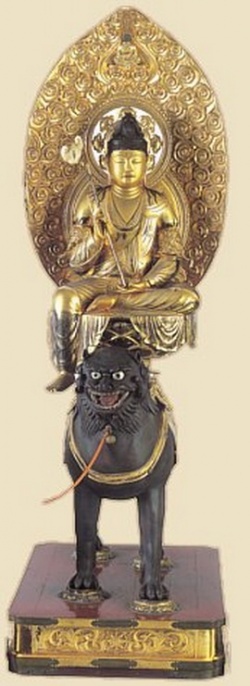Difference between revisions of "Seng-chao"
| Line 1: | Line 1: | ||
[[File:Monju-kishi-monju-chusonji.jpg|thumb|250px|]] | [[File:Monju-kishi-monju-chusonji.jpg|thumb|250px|]] | ||
<poem> | <poem> | ||
| − | + | [[Seng-chao]] | |
| − | + | [[僧肇]] (384–414) (PY [[Sengzhao]]; Jpn [[Sojo]]) | |
| − | A [[priest]] of [[Ch'ang-an]] in [[China]] and a [[disciple]] of [[Kumarajiva]]. He first studied the {{Wiki|Taoist}} [[philosophy]] of [[Lao Tzu]] and [[Chuang Tzu]]. On reading the [[Vimalakirti Sutra]], however, he took a deep [[interest]] in [[Buddhism]] and resolved to become a [[Buddhist]] [[priest]]. Later he [[heard]] of [[Kumarajiva]] and became one of his most [[outstanding]] [[disciples]], assisting [[Kumarajiva]] in the translation of [[Buddhist scriptures]]. He wrote The Treatises of | + | A [[priest]] of [[Ch'ang-an]] in [[China]] and a [[disciple]] of [[Kumarajiva]]. He first studied the {{Wiki|Taoist}} [[philosophy]] of [[Lao Tzu]] and [[Chuang Tzu]]. On reading the [[Vimalakirti Sutra]], however, he took a deep [[interest]] in [[Buddhism]] and resolved to become a [[Buddhist]] [[priest]]. Later he [[heard]] of [[Kumarajiva]] and became one of his most [[outstanding]] [[disciples]], assisting [[Kumarajiva]] in the translation of [[Buddhist scriptures]]. He wrote The [[Treatises of Seng-chao]], which elucidates the [[Wikipedia:concept|concepts]] of [[non-substantiality]], [[wisdom]], and [[nirvana]], and The Afterword to the [[Lotus Sutra]] Translation, which describes [[Kumarajiva]] translating the [[Lotus Sutra]]. |
.... | .... | ||
| − | [[Sengzhao]] (or [[Seng-Chao]]) ({{Wiki|Chinese}}: [[僧肇]]; pinyin: Sēngzhào; Wade–Giles: [[Seng-chao]]; {{Wiki|Japanese}}: [[僧肇]], Sōjō) (384–414), from Jingzhao, was a [[Buddhist]] {{Wiki|Chinese}} [[philosopher]] and the first [[disciple]] of [[Kumārajīva]]. He helped translate [[Indian]] treatises and also wrote his own. These [[form]] the only source of study for early {{Wiki|Chinese}} [[Mādhyamika]] [[Buddhism]]. He is mentioned in the Memoirs of | + | [[Sengzhao]] (or [[Seng-Chao]]) ({{Wiki|Chinese}}: [[僧肇]]; pinyin: [[Sēngzhào]]; Wade–Giles: [[Seng-chao]]; {{Wiki|Japanese}}: [[僧肇]], Sōjō) (384–414), from [[Jingzhao]], was a [[Buddhist]] {{Wiki|Chinese}} [[philosopher]] and the first [[disciple]] of [[Kumārajīva]]. He helped translate [[Indian]] treatises and also wrote his own. These [[form]] the only source of study for early {{Wiki|Chinese}} [[Mādhyamika]] [[Buddhism]]. He is mentioned in the [[Memoirs of Eminent Monks]]. |
| − | [[Sengzhao]] criticized earlier | + | [[Sengzhao]] criticized earlier [[Chinese Buddhist schools]] for believing in [[being]] or [[non-being]]. He concluded that all [[dharmas]] are [[empty]]. |
He was also influenced by the [[Taoists]] {{Wiki|Laozi}} and [[Zhuangzi]]. | He was also influenced by the [[Taoists]] {{Wiki|Laozi}} and [[Zhuangzi]]. | ||
Contribution | Contribution | ||
| − | He composed a series of text, named [[Zhao | + | He composed a series of text, named [[Zhao Lun]], which has been translated into {{Wiki|English}} by Walter Liebenthal. |
</poem> | </poem> | ||
{{R}} | {{R}} | ||
Revision as of 13:14, 14 January 2015
Seng-chao
僧肇 (384–414) (PY Sengzhao; Jpn Sojo)
A priest of Ch'ang-an in China and a disciple of Kumarajiva. He first studied the Taoist philosophy of Lao Tzu and Chuang Tzu. On reading the Vimalakirti Sutra, however, he took a deep interest in Buddhism and resolved to become a Buddhist priest. Later he heard of Kumarajiva and became one of his most outstanding disciples, assisting Kumarajiva in the translation of Buddhist scriptures. He wrote The Treatises of Seng-chao, which elucidates the concepts of non-substantiality, wisdom, and nirvana, and The Afterword to the Lotus Sutra Translation, which describes Kumarajiva translating the Lotus Sutra.
....
Sengzhao (or Seng-Chao) (Chinese: 僧肇; pinyin: Sēngzhào; Wade–Giles: Seng-chao; Japanese: 僧肇, Sōjō) (384–414), from Jingzhao, was a Buddhist Chinese philosopher and the first disciple of Kumārajīva. He helped translate Indian treatises and also wrote his own. These form the only source of study for early Chinese Mādhyamika Buddhism. He is mentioned in the Memoirs of Eminent Monks.
Sengzhao criticized earlier Chinese Buddhist schools for believing in being or non-being. He concluded that all dharmas are empty.
He was also influenced by the Taoists Laozi and Zhuangzi.
Contribution
He composed a series of text, named Zhao Lun, which has been translated into English by Walter Liebenthal.
